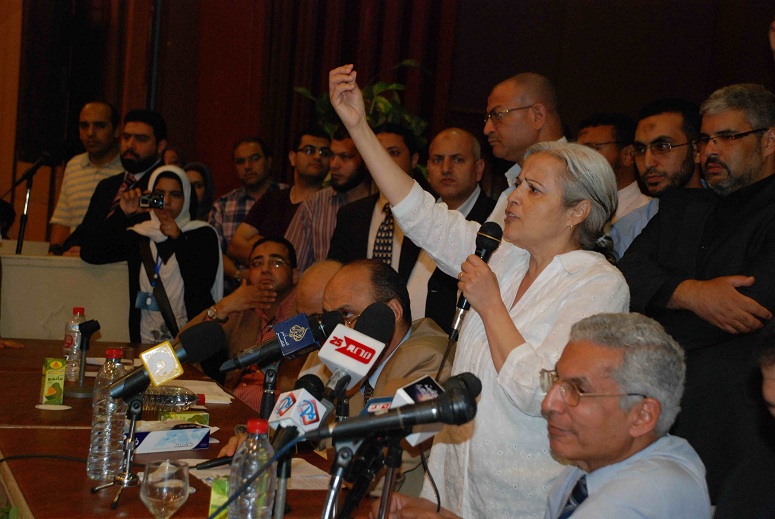
(Photo courtesy of Ahmed Mansour)
Qatari media network Al Jazeera has called for the release of their journalist Ahmed Mansour, who is being detained by German authorities, in a case whose international legal basis remains unclear.
Mansour, a senior journalist with Al Jazeera, was detained at Berlin’s Tegel Airport Saturday afternoon apparently in relation to an Egyptian legal case in which he received a 15-year prison sentence in 2014. In that case, he stood trial for the alleged torture and electrocution of a lawyer in Tahrir Square during the 25 January Revolution – both he and the media network deny the charges against him.
“The crackdown on journalists by Egyptian authorities is well known. Our network, as the Arab world’s most-watched, has taken the brunt of this. Other countries must not allow themselves to be tools of this media oppression, least of all those that respect freedom of the media as does Germany,” Acting Director General of Al Jazeera network Mostefa Souag said. “Ahmed Mansour is one of the Arab world’s most respected journalists and must be released immediately.”
The dual British-Egyptian citizen was shooting the latest episode of his show “Without Limits” in Berlin, when he was detained at the airport en route to his Qatar residence.
Al Jazeera reported that Mansour said in a phone-call that he will remain in custody until Monday, when he will face a German judge who will decide on his case. Although the detention was initially reported as related to an Interpol warrant, Mansour denies that there is an active warrant on him from the international agency.
Mansour’s arrest comes two weeks after Egyptian President Abdel Fattah Al-Sisi was received by Chancellor Angela Merkel in Germany. During the trip, Al-Sisi signed off a €10bn deal with engineering giant Siemens to build gas and wind power plants in Egypt.
“The airport authorities detained me based on an Interpol order at the request of the Egyptian authorities. I informed [the police] that the global police organisation has rejected Egypt’s request and that I have this document from the Interpol to prove that I am not wanted in any charge. I also told them that all the cases that were filed against me in Egypt were fabricated. They, however, insisted on holding me in their detention centre for investigation. They told me that they will transfer me to face an investigating judge, who will determine my case,” Mansour said.
In a statement Sunday, published by state-owned news agency MENA, a press unit working within the Egyptian Ministry of Interior announced it had previously submitted to all state members of Interpol a general list of every individual convicted by Egyptian courts residing abroad.
In two videos posted online Sunday morning via social media, Mansour suggests his arrest is not derived from an Interpol warrant.
“I asked [the German authorities] whether there was an agreement between both countries to conduct the arrest and they say no,” Mansour said. He continued that the arrest was a German initiative, not related to the Interpol request submitted by Egyptians.
“German authorities are dealing with the case in a very suspicious way… My lawyer thinks that there probably was some deal between Al-Sisi and Germany when visited.”
Attempts to contact German authorities to confirm the legal basis of Mansour’s detention were unsuccessful, with the police force only confirming to Daily News Egypt that he was detained.
In the statement shared online by Mansour, an NGO calling itself the Arab Organisation for Human Rights in Britain (AOHR) claims that, as there was no Interpol warrant on Mansour, German authorities were operating on the basis of a shared data system. This allows governments to circulate warrants without the need for a ‘Red Notice’ international arrest warrant.
“Many despotic regimes have made use of this system to arrest activists and members of the political opposition,” the statement reads. “INTERPOL has rejected many calls to abolish this system.”
Al Jazeera fell out with the Egyptian government after the ouster of former president Mohamed Morsi in 2013, due to the network’s coverage of the 30 June events. Qatar, its main media outlet, and Egypt have since had numerous diplomatic fallouts, with Al-Sisi’s regime accusing Doha of supporting the Muslim Brotherhood organisation.
Three journalists from Al Jazeera English spent over a year in an Egyptian prison on charges of aiding a banned group after the ejection of the Brotherhood government. In February, Australian Peter Greste was deported, but two of his colleagues, Baher Mohamed and Mohamed Fahmy, still face retrial.
Mansour is known to be affiliated to the Brotherhood, and it is widely held that he took part in writing some of former president Morsi’s speeches.
Protests are due to be staged in Berlin Sunday in solidarity with Mansour.


